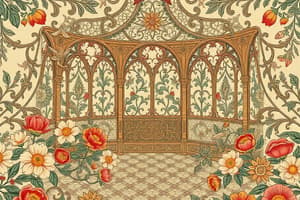Podcast
Questions and Answers
Who coined the phrase 'form ever follows function'?
Who coined the phrase 'form ever follows function'?
- William Morris
- Frank Lloyd Wright
- Le Corbusier
- Louis Sullivan (correct)
What is the main principle that 'form follows function' refers to in design theory?
What is the main principle that 'form follows function' refers to in design theory?
- Function should adapt to the form of the building or object
- The shape of a building or object should relate primarily to its intended function (correct)
- The shape of a building or object should prioritize aesthetics over function
- Aesthetics should take precedence over practical needs
Which movement emphasized 'make do and mend workmanship' as more practical than profit-driven manufacturing?
Which movement emphasized 'make do and mend workmanship' as more practical than profit-driven manufacturing?
- Arts & Crafts movement (correct)
- Minimalism movement
- Futurism movement
- Bauhaus movement
In product design, how does the principle of 'form follows function' apply?
In product design, how does the principle of 'form follows function' apply?
Which area does NOT usually follow the principle of 'form follows function'?
Which area does NOT usually follow the principle of 'form follows function'?
What did William Morris emphasize in the context of design workmanship?
What did William Morris emphasize in the context of design workmanship?
Who believed that architecture must prioritize practical needs over aesthetics?
Who believed that architecture must prioritize practical needs over aesthetics?
'Form ever follows function' became known as one of the earliest tenets of modern Architecture due to which designer?
'Form ever follows function' became known as one of the earliest tenets of modern Architecture due to which designer?
'Make do and mend workmanship' was associated with which design movement?
'Make do and mend workmanship' was associated with which design movement?
In what context did Louis Sullivan coin the phrase 'form ever follows function'?
In what context did Louis Sullivan coin the phrase 'form ever follows function'?
Flashcards
Form Follows Function
Form Follows Function
The shape of a building or object should primarily relate to its intended purpose or function.
Louis Sullivan
Louis Sullivan
An American architect who coined the phrase "form ever follows function."
Functional Product Design
Functional Product Design
Prioritizing a product's utility and purpose over its visual appearance.
Effective Design
Effective Design
Signup and view all the flashcards
Study Notes
In design theory, form follows function is the principle that the shape of a building or object should primarily relate to its intended function or purpose. This concept was popularized by architects like Le Corbusier and Louis Sullivan, who believed that architecture must serve practical needs first before considering aesthetics.
The principle can be traced back to the Arts & Crafts movement in Britain, where William Morris emphasized that make do and mend workmanship was more practical than manufacturing things under the pressure of profit. However, it was Louis Sullivan, an American architect and designer, who coined the phrase "form ever follows function," which became known as one of the earliest tenets of modern architecture.
In the context of product design, this principle suggests that a product's appearance should grow out of its intended use and purpose. For example, consider a chair: it should have a comfortable design without sacrificing functionality. Similarly, any mechanism within the chair should be designed to hold the weight of the person sitting on it while remaining efficient in operation.
The philosophy behind form following function extends beyond traditional design disciplines to encompass all areas of human creativity. Architecture, interior design, industrial design, graphic design, fashion, and even software user interfaces follow this principle. By prioritizing the utility of an object over its visual appeal, designers ensure that their creations serve their intended purposes effectively and efficiently.
However, some argue that the extreme interpretation of form following function leads to monotonous designs with little character or personality. Critics claim that art and aesthetics should play a role in shaping the built environment. Despite these concerns, form following function remains a fundamental aspect of design thinking today, guiding practitioners in creating products, spaces, and experiences that meet the needs of users while also being visually pleasing.
Studying That Suits You
Use AI to generate personalized quizzes and flashcards to suit your learning preferences.




